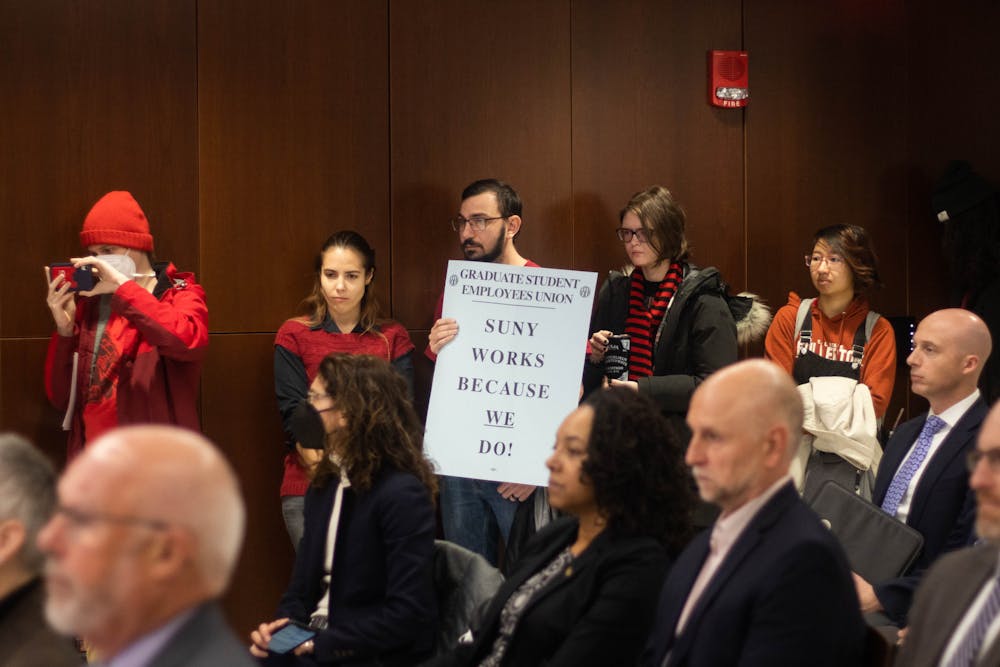Union-represented graduate and teaching assistants at SUNY campuses across the state will have their fees reduced after the New York State Legislature voted to include $3 million of funding for fee mitigation in the 2024 state budget.
SUNY is working with individual schools like UB "to use the funding to mitigate graduate-student fees," a UB spokesperson said.
The change affects hundreds of union-represented graduate assistants (GAs) and teaching assistants (TAs) at UB and could eventually eliminate their fees, according to the Communications Workers of America (CWA), which represents SUNY graduate workers statewide. Fees at UB total $1,539 per semester for most graduate students.
“These workers have suffered dire financial challenges that are greatly exacerbated by the imposition of onerous fees. A substantial portion of graduate student income that would normally go towards paying rent, buying groceries, or making car payments must be returned to their employer in the form of fees,” CWA vice president Dennis Trainor said in a statement. “We are very happy that this budget finally corrects this wrong.”
UB administrators had previously eliminated fees for most graduate workers, but not for non-doctoral graduate workers or graduate students working outside of their academic department. That meant that about one-third of UB’s 1,100 union-represented graduate workers were still paying fees, according to Lawrence Mullen, the 2022-23 business agent for the Graduate Student Employees Union (GSEU), which represents UB’s graduate workers.
The fees are particularly burdensome in the fall semester, Mullen says, because graduate workers don’t get paid until mid-September but are expected to pay their fees in August. Many, Mullen among them, have gone into credit card debt or taken out additional loans to pay the fees.
“I have had people say that it is borderline life-changing to not have to pay a quarter of your salary back to your employer, if you’re making [a] $12,000 [stipend]. This really sets people up to be able to succeed and be able to focus more on the semester starting,” Mullen said. “This is really substantial to the people who have been excluded from all of the previous fee wins and stipends.”
The fee mitigation funding was a long time coming, Mullen says. The GSEU and its counterparts at other SUNY campuses have been pushing for the elimination of graduate workers’ fees since 2019. Much of that early lobbying in Albany consisted of explaining to state legislators that graduate workers are frequently the instructor of record and do much more than just helping tenured faculty grade papers.
Graduate workers made good progress before the pandemic, but state budget shortfalls in the wake of COVID-19 made the prospect of approving additional spending impossible. Nevertheless, they continued lobbying the state legislature throughout the pandemic and had laid the groundwork for the bill’s passage by the time budget freezes expired.
Mullen also says that fee mitigation efforts at the campus level at UB, Binghamton University and Stony Brook University served as a “catalyst” for the state-level action.
“It no longer was something that we were asking for just through kind of a state legislature item or something, but it was something that we were actively fighting for on campuses and winning,” Mullen said. “I think that really demonstrated to people that this was something that we were going to keep pursuing because it mattered deeply to our members.”
The fee elimination comes at a particularly convenient time for the GSEU, which is entering contract negotiations with UB. Mullen says the GSEU was originally going to push for more fee elimination, but they simply “don’t have to do that anymore.”
“It sets us up really well to be able to use a lot of our ability to leverage past wins toward other things, like higher stipends, because we won’t have to be focused on fees,” Mullen said. “That’s already taken care of.”
CORRECTION: This story has been updated to more accurately describe how the fees will be used to mitigate graduate workers' fees.
Grant Ashley is the editor in chief and can be reached at grant.ashley@ubspectrum.com

Grant Ashley is the editor in chief of The Spectrum. He's also reported for NPR, WBFO, WIVB and The Buffalo News. He enjoys taking long bike rides, baking with his parents’ ingredients and recreating Bob Ross paintings in crayon. He can be found on the platform formerly known as Twitter at @Grantrashley.





